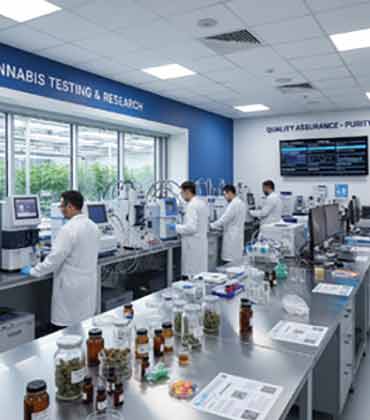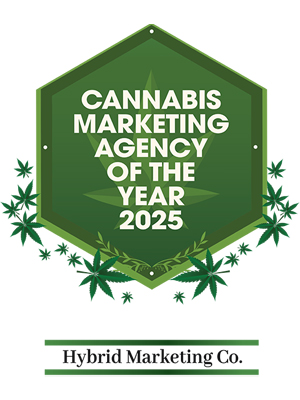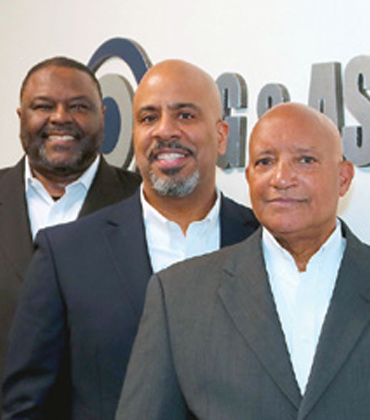Thank you for Subscribing to Cannabis Business Insights Weekly Brief
Cannabis Business Insights: Specials Magazine
The cannabis industry has experienced remarkable growth in recent years, but beneath the surface of this rapid expansion lies a complex web of challenges. Businesses struggle to differentiate themselves in an increasingly saturated market, where razor-thin margins and stringent regulations create an unforgiving landscape. At the same time, investors often enter the industry expecting quick returns, only to grapple with steep learning curves, complex compliance requirements, and an evolving consumer base. While marketing could be a bridge to overcome these hurdles, conventional approaches often fall short. Enter Hybrid Marketing Co., a business-outcomes focused agency dedicated to growth for B2B and B2C cannabis brands and fostering the long-term sustainability and maturity of the cannabis industry itself. Hybrid’s mission extends beyond successful campaigns; it’s about creating lasting impact for clients while shaping the industry’s growth in the right direction. “Our aim is to create a positive impact every day, not only for our clients and colleagues, but for the industry as a whole. Because we started life as a go-to-market business consultancy, our approach is unique. Specifically, we hold business outcomes at the center of each customized strategy, and specifically design each program to impact 5 key business drivers: revenue, risk, cost, cashflow, and asset utilization. Words you don’t often hear from a marketer’s mouth,” says Jenny Lamboy, Vice President of Strategy. More than Just Marketing: A Business-First Approach As a high-value versus a high-volume agency, Hybrid believes effective B2B and B2C marketing goes beyond surface-level promotions. Unlike traditional agencies focused solely on brand visibility, it integrates business strategy, sales alignment, and customer acquisition to drive measurable growth. Instead of high-volume, one-size-fits-all tactics, the agency prioritizes high-value engagements, building a sustainable customer base over fleeting spikes in engagement. Five key business drivers guide Hybrid’s strategies: ● Revenue Growth: Every strategy is designed with revenue acceleration in mind, ensuring marketing directly contributes to increased sales. ● Risk Reduction: The cannabis industry is heavily regulated, and missteps can result in hefty fines or business shutdowns. Hybrid ensures compliance-first marketing strategies, mitigating legal risks. ● Cost Efficiency: Marketing spending is optimized for maximum return, focusing on high-impact activities instead of wasteful advertising. ● Cash Flow: Unstructured spending leads to instability. Hybrid aligns marketing budgets with overall business financial health. ● Asset Utilization: Hybrid ensures clients maximize their existing resources, avoiding unnecessary costs while improving output. This business-outcomes-focused approach ensures that marketing isn’t just an expense but a long-term investment – particularly prioritizing ROI. Hybrid’s focus on optimization and agility allows it to continuously refine strategies to adapt to regulatory shifts and changing consumer behavior, keeping clients ahead of the curve.
When cannabis retail first emerged, it came under intense scrutiny. Public scepticism, unfamiliarity with the product, and stringent regulations created a perception that dispensaries needed extreme security—think surveillance towers and reinforced vaults. In those early days, many businesses implemented heavy-handed security measures that made spaces feel intimidating rather than inviting. But as the industry has matured and become more mainstream, the narrative has shifted. Security is still non-negotiable, but today’s cannabis consumers expect more—they value professionalism, comfort, and trust. Modern dispensaries must balance safety with warmth, creating spaces where customers feel secure and at ease. That’s where CLG & Associates enters the picture. Founded by three retired Maryland law enforcement professionals with diverse experience in investigations, narcotics, and leadership, CLG & Associates was purpose-built for the cannabis industry. From the outset, the company focused on delivering tailored security solutions—not generic packages—to an industry growing fast and facing constant regulatory change. “Rather than taking a one-size-fits-all approach, we work hand-in-hand with dispensary operators to understand their unique environments, operations, and brand identities. The process doesn’t begin with a proposal—it begins with a conversation,” says Ismael Vincent Canales, president and CEO. The CLG team visits the client’s location for a detailed consultation. This includes evaluating crime data, foot traffic patterns, infrastructure, and internal workflows. The company asks the right questions: Is the area high-risk or low-risk? Is access to the facility controlled? What kind of customer experience is the brand aiming for?
CXO INSIGHTS

Cultivating Innovations in Cannabis Agriculture
Michael Towey, Senior Vice President of Production and Infrastructure, Good Day Farm

A New Standard for Responsible Pulp and Paper Production
Kerri Whitfield, Director of Brand Marketing, Trulieve

Potential of Cell and Gene Therapy
Alexis Bossie, Director, Media R&D, Lonza

Eddy Wang: Driving Operational Growth through Steady Leadership
Eddy Wang, Senior Engineering Manager, Leviton

Flexibility to Change is the Key to Successful Pharma Projects
Carrie Lewis, Executive Director, Clinical Program Optimization, Endo Pharmaceuticals Inc
IN FOCUS
EDITORIAL
The Expanding Horizons of the Cannabis Sector
Driven by shifting attitudes toward the use of cannabis for medicinal and recreational purposes, coupled with emerging changes in the regulatory environment regarding its cultivation and distribution, this industry is making milestones toward acceptance by more regions. As it continues to gain ground, from the perspective of industry, it's pretty evident that cannabis is no longer a simple commodity-it's an emerging global industry.
The global cannabis market is set to reach about $90.4 billion by 2026. Growth is directly linked to increased efforts demanding legalization, particularly in North America and parts of Europe, where many countries have legalized or decriminalized possessing the plant. With the complexities attached to the patchwork of state laws in the United States, the government is among the significant growth factors, presenting more than $25 billion from legal cannabis sales in 2021. With more countries realizing potential revenues from cannabis legalization, the economic argument becomes too prominent to be ignored.
The industry is indeed multifaceted, from agricultural cultivation and distribution to ancillary services such as cannabis technology, research, and branding, which offer many opportunities for would-be entrepreneurs and investors. Cannabis holds promise for various fields beyond pure business, including healthcare, where cannabis-based treatment mechanisms for pain management, anxiety, and other conditions are receiving wide clinical attention.
There are hurdles ahead. Regulatory issues, taxation questions, and public stigma keep this industry from achieving its full potential. Nevertheless, the cannabis business is indeed a unique juncture of economic, medicinal, and social opportunities—an industry with endless worth for those willing to negotiate its twisty corridors.
Innovation and acceptance continue to evolve in different scenarios, and the cannabis industry awaits significant growth in the future. As it continues redefining its possibilities, it reminds us that the most revolutionary sectors sometimes come from the most unpretentious sources.









